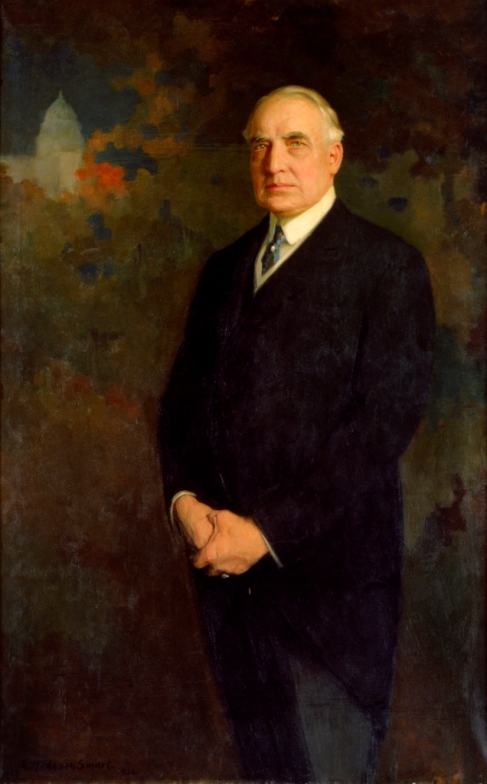Most historians have been supremely unjust to Warren G. Harding. As Paul Johnson, in Modern Times, observes, the process to create a mythological narrative around the man and his administration started almost immediately. The publication of his papers long ago discredited every mischaracterization which textbooks and authors, who should know better, still repeat as “fact” as they simultaneously omit his accomplishments. It is forgotten that the Harding-Coolidge ticket won an historic landslide on the platform of normalcy, the return of America to the quiet progress of hard work, limited government, civic participation and the true independence of avoiding costly and destructive entanglements abroad, a policy President Washington had warned against less than one hundred and fifty years before.
It is forgotten that Harding achieved much that is worth recognizing today. He guided the nation out of the wreckage of World War, depression and loss laying the foundation for the unprecedented prosperity across the economic spectrum. He showed how to successfully get out of the way in economic hard times by actually cutting 40% of government expenses while reducing taxes, enabling self-correction of the markets to occur and growth to return.
Hoover should have been paying attention.
He is discounted as a poor judge of men but he selected some of the best qualified leaders to serve in the Cabinet, from Hughes at State to Mellon at Treasury.
It was Harding who shepherded the Budget and Accounting Act of 1921 that brought order and responsibility to government budgeting for the first time.
It was Harding who fought for and achieved the first tax cuts of the 1920s, that would pay down the debt, ensure people worked more for themselves than for government, and participated more in their own affairs.
It was Harding, by nominating William H. Taft to be Chief Justice, who merits some credit for the complete reorganization of the Judiciary by the “Judge’s Bill” of 1925, improving much in the way the federal Courts worked so that justice moved swifter and more efficiently.
It was Harding who pardoned Eugene Debs, the Socialist leader imprisoned by the Wilson administration along with numerous others. By doing so, Harding restored a commitment to peace, calm and healing from the discord and division encouraged by his predecessor.
These real accomplishments deserve more consideration than history has given Warren Harding. We deprive ourselves of the constructive lessons he taught when we see only his failures and stop short of understanding his successes. He deserves better. So do we.
Writing of his predecessor, Calvin Coolidge said,
The country had little interest in mere destructive criticism. It wanted the progress that alone comes from constructive policies…I witnessed the gigantic task of demobilizing a war government and restoring it to a peace-time basis…The efforts of President Harding to restore the country became familiar to me. I saw the steady increase of the wise leadership of Mr. Hughes and Mr. Mellon in the administration of the government and the passing of some of the veteran figures of the Senate…Later it was disclosed that he had discovered that some whom he had trusted had betrayed him and he had been forced to call them to account. It is known that this discovery was a very heavy grief to him, perhaps more than he could bear. I never saw him again. In June he started for Alaska and–eternity.
A reappraisal of his accomplishments is in order. It will reveal a man who defies the conventional wisdom in which he has been relegated and marginalized for more than ninety years. What better time than now to reassess the substance of spending cuts, strict budgeting, individual freedom and a return to our founding ideals, choosing to remain independent and not the vassal of the nations?

I think that is a kind assessment of Harding. What has always amazed me is the grace that Coolidge treated Harding with and his ability to complete many of Harding’s goals. From my perspective Wilson is one of the most over-rated presidents – his writing beginning with Congressional Government, is dismissive of the Founders and arrogant as only an academic can be (I am an academic so I know the genre). He was like the current president (although Wilson was actually a professor where Obama was only a part time lecturer) heavily invested in ideology and mostly unable to work with Congress. I think Harding is placed low in the ranking of presidents mostly because he was a get along guy who basically wanted to work with his buddies. Coolidge is one of the most under-rated presidents because he was able to stick to his goals and get many of them accomplished. I do not like his attachment to tariffs but that was a sign of his times. His understanding of the risks of debt and the benefits of simplifying the income tax system could benefit the country today.
This is an excellent assessment of the fundamental differences between these three Presidents. I agree, especially about Coolidge’s focus on his goals. He was able to succeed where the others fell short because he knew who he was, what he wanted to accomplish and respected our Constitutional system through it all. He retained humility in his responsibilities. His grasp of human nature and unshakable integrity informed his actions, as it ought. The modern notion of separating policy positions from moral standards is both arrogant and destructive of the very ends which public service is meant to achieve. It is no wonder that politics, gutted of those essentials, is now despoiling and ruling the people rather than representing and serving them. If law does not equally restrain government, no one is safe in even the smallest exercise of liberty or the most mundane decision of life. Thank you for commenting.